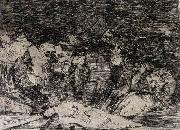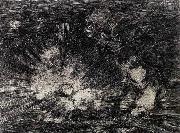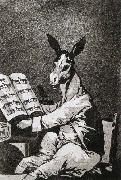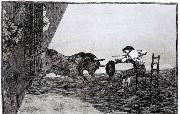Francisco de goya y Lucientes Huiler la Reproduction de TableauAll Francisco de goya y Lucientes Oil Paintingsb. March 30, 1746, Fuendetodos, Spain--d. April 16, 1828, |
|||

|
|||
|
|
|||
|
||||||||||||
| Francisco de goya y Lucientes b. March 30, 1746, Fuendetodos, Spain--d. April 16, 1828, |
||||||||||||
|
|
||||||||||||
| ID de tableau:: 62465 Truth Has Died Truth Has Died 1810-1814 Etching, 175 x 220 mm - This is Plate 79 from the series The Disasters of War (Los desastres de la guerra). In the concluding plates of the Disasters of War are shown the burial of a beautiful young woman, followed by her exhumation or resurrection . Captioned Murio la verdad (Truth has Died), the first shows her body radiant with light as she lies in her grave and a looming priest administers the last rites. In the companion print, Si reucitaria? (Will She Rise Again?), she is exposed, her radiance and beauty faded, her face aged. Still she emits a glow that seems all the greater for the depth of background shadow - and sufficient to throw the crowd of peering ghouls into a frenzy. Here, the parallel hatching of the first etched plate is replaced by radiant lines, inked more intensely as they spread away from the body. Author: GOYA Y LUCIENTES, Francisco de Title: Truth Has Died (Murio la verdad) Form: graphics , 1801-1850 , Spanish , other 1810-1814 Etching, 175 x 220 mm - This is Plate 79 from the series The Disasters of War (Los desastres de la guerra). In the concluding plates of the Disasters of War are shown the burial of a beautiful young woman, followed by her exhumation or resurrection . Captioned Murio la verdad (Truth has Died), the first shows her body radiant with light as she lies in her grave and a looming priest administers the last rites. In the companion print, Si reucitaria? (Will She Rise Again?), she is exposed, her radiance and beauty faded, her face aged. Still she emits a glow that seems all the greater for the depth of background shadow - and sufficient to throw the crowd of peering ghouls into a frenzy. Here, the parallel hatching of the first etched plate is replaced by radiant lines, inked more intensely as they spread away from the body. Author: GOYA Y LUCIENTES, Francisco de Title: Truth Has Died (Murio la verdad) Form: graphics , 1801-1850 , Spanish , other |
||||||||||||
|
|
||||||||||||
| ID de tableau:: 62466 Will She Rise Again Will She Rise Again 1810-1814 Etching, 175 x 220 mm - This is Plate 80 from the series The Disasters of War (Los desastres de la guerra). In the concluding plates of the Disasters of War are shown the burial of a beautiful young woman, followed by her exhumation or resurrection . Captioned Murio la verdad (Truth has Died), the first shows her body radiant with light as she lies in her grave and a looming priest administers the last rites. In the companion print, Si reucitaria? (Will She Rise Again?), she is exposed, her radiance and beauty faded, her face aged. Still she emits a glow that seems all the greater for the depth of background shadow - and sufficient to throw the crowd of peering ghouls into a frenzy. Here, the parallel hatching of the first etched plate is replaced by radiant lines, inked more intensely as they spread away from the body 1810-1814 Etching, 175 x 220 mm - This is Plate 80 from the series The Disasters of War (Los desastres de la guerra). In the concluding plates of the Disasters of War are shown the burial of a beautiful young woman, followed by her exhumation or resurrection . Captioned Murio la verdad (Truth has Died), the first shows her body radiant with light as she lies in her grave and a looming priest administers the last rites. In the companion print, Si reucitaria? (Will She Rise Again?), she is exposed, her radiance and beauty faded, her face aged. Still she emits a glow that seems all the greater for the depth of background shadow - and sufficient to throw the crowd of peering ghouls into a frenzy. Here, the parallel hatching of the first etched plate is replaced by radiant lines, inked more intensely as they spread away from the body |
||||||||||||
|
|
||||||||||||
| ID de tableau:: 62467 As far back as his grandfather As far back as his grandfather 1797-98 Aquatint, 215 x 150 mm - Goya caricatures the pride of the hidalgos. Some 500.000 of Spain's population of around 10 million considered themselves to belong to this lesser branch of the nobility. Since work was beneath their station, most of them were impoverished, their only possessions being a long line of ancestors. Author: GOYA Y LUCIENTES, Francisco de Title: As far back as his grandfather Form: graphics , 1801-1850 , Spanish , other 1797-98 Aquatint, 215 x 150 mm - Goya caricatures the pride of the hidalgos. Some 500.000 of Spain's population of around 10 million considered themselves to belong to this lesser branch of the nobility. Since work was beneath their station, most of them were impoverished, their only possessions being a long line of ancestors. Author: GOYA Y LUCIENTES, Francisco de Title: As far back as his grandfather Form: graphics , 1801-1850 , Spanish , other |
||||||||||||
|
|
||||||||||||
| ID de tableau:: 62468 The Morisco Gazul is the First to Fight Bulls with a Lance The Morisco Gazul is the First to Fight Bulls with a Lance 1815-16 Etching and aquatint, 250 x 350 mm - This is Plate 5 from the series Tauromaquia. Author: GOYA Y LUCIENTES, Francisco de Title: The Morisco Gazul is the First to Fight Bulls with a Lance Form: graphics , 1801-1850 , Spanish , other 1815-16 Etching and aquatint, 250 x 350 mm - This is Plate 5 from the series Tauromaquia. Author: GOYA Y LUCIENTES, Francisco de Title: The Morisco Gazul is the First to Fight Bulls with a Lance Form: graphics , 1801-1850 , Spanish , other |
||||||||||||
|
|
||||||||||||
| ID de tableau:: 62469 The Bravery of Martincho in the Ring of Saragassa The Bravery of Martincho in the Ring of Saragassa 1815-1816 Etching and aquatint, 245 x 355 mm - This is Plate 18 from the series Tauromaquia. While working on The Disasters of War, Goya also etched 33 plates, which he offered for sale under the title of Tauromaquia (The Art of Bullfighting). Here he depicts a famous torero, seated on a chair and with his feet tied, preparing to deliver the bull a fatal thrust. A moment of extreme tension, which Goya makes palpable by abandoning the traditional rules of perspective. Author: GOYA Y LUCIENTES, Francisco de Title: The Bravery of Martincho in the Ring of Saragassa (Tauromaquia 18) Form: graphics , 1801-1850 , Spanish , other 1815-1816 Etching and aquatint, 245 x 355 mm - This is Plate 18 from the series Tauromaquia. While working on The Disasters of War, Goya also etched 33 plates, which he offered for sale under the title of Tauromaquia (The Art of Bullfighting). Here he depicts a famous torero, seated on a chair and with his feet tied, preparing to deliver the bull a fatal thrust. A moment of extreme tension, which Goya makes palpable by abandoning the traditional rules of perspective. Author: GOYA Y LUCIENTES, Francisco de Title: The Bravery of Martincho in the Ring of Saragassa (Tauromaquia 18) Form: graphics , 1801-1850 , Spanish , other |
||||||||||||
|
|
||||||||||||
| Artiste précédent Artiste prochain | ||||||||||||
|
|
||||||||||||
|
Francisco de goya y Lucientes b. March 30, 1746, Fuendetodos, Spain--d. April 16, 1828, |
||||||||||||
|
|
||||||||||||
|
CONTACTER DES Etats-Unis |










